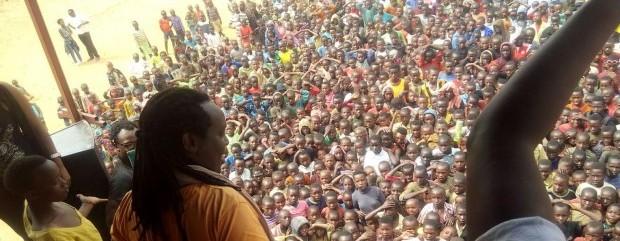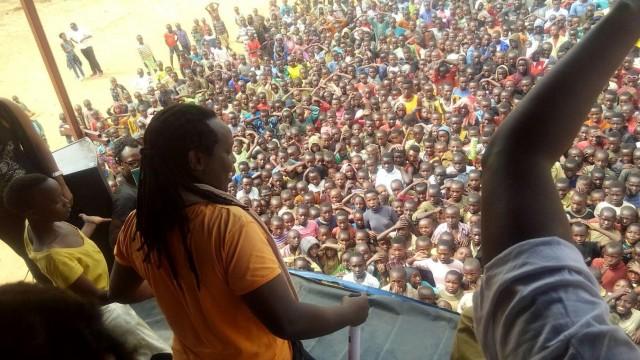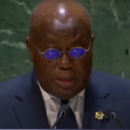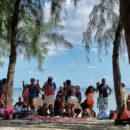“Let us be heard”: Burundi’s refugees tell stories of ethnic targeting

Burundi’s crisis began as a political dispute, but testimony from refugees suggests that some parties to the conflict may be exploiting Hutu-Tutsi divides.

Burundian refugees gather round as artists and dancers visit Mahama Refugee Camp on Christmas Day 2015. Credit: Djamal Ntagara, Uburanga Art Centre, Kigali.
Near the small town of Gashora in Rwanda, about 20km north of the border with Burundi, hundreds of children and their mothers sit outside tents (or “hangers”) branded with the UNHCR logo. Young boys play football in worn clothing as they pass the time, while malnourished babies lie in a row awaiting treatment from a special medical tent.
Since April 2015, at least 240,000 people have fled Burundi as it has descended into a violent political crisis. A large proportion of these refugees have journeyed north into neighbouring Rwanda, and tens of thousands have ended up here at Gashora Reception Centre before being transferred for more permanent stay at Mahama Refugee Camp. Many have been separated from their loved ones back in Burundi, who may or may not still be alive, and each has his or her own unique story of loss, suffering, and violence.
According to official records, the camp received around 17,000 people in April and another 19,000 over the subsequent fourth months before numbers dropped to hundreds per month. Approximately 60% of these are under 18.
However, the total number of refugees to this area is likely to be significantly higher. Burundians are only taken to Gashora if they indicate at the border office that they are fleeing for political reasons. But with many are afraid to admit being refugees, large numbers say they are crossing into Rwanda for economic motivations or to visit family. Many of these try to assimilate in the nearby town of Nyanza.
Testimony from the camps
The ongoing crisis in Burundi began last April when President Pierre Nkurunziza decided to run for a third term in office – in violation of the constitution and Arusha Accords according to critics – and then won the disputed election in July.
Since then, hundreds have been killed or assassinated on the streets of Bujumbura, while opposition militia have clashed on occasion with government troops. Furthermore, last month, nine mass graves were reportedly discovered around the capital. According to UN human rights chief, Zeid Ra’ad al-Hussein, these sites are believed to hold the bodies of the dozens of Burundians killed in a deadly reprisal attack by security forces on 11 December.
With independent radio stations and media restricted, reliable information in Burundi is difficult to come by. However, as the crisis persists, one question on many people’s lips is to what extent the clashes relate to historical divides between Burundi’s majority Hutu and minority Tutsi populations. There are growing reports that the government is targeting Tutsis, while the recently discovered mass graves are believed to hold mostly Tutsi victims.
Burundi’s turmoil certainly began as a political dispute, but there are fears that ethnicity has since been instrumentalised by actors in the conflict for their own gain. The testimonies of some refugees – whose voices tend to have been neglected in the debate around Burundi thus far – seem to support these concerns.
Jean Bosco has been in the refugee camp with his wife and four children since April. He says that he fled Burundi after being targeted by groups associated with the ruling CNDD-FDD for being a Tutsi.
“The CNDD-FDD youth [known as the Imbonerakure] started to threaten me and my family, saying: we killed armed Tutsis, soon it’s going be your turn,” Bosco tells African Arguments. “One morning, the policemen and Imbonerakure came and ordered that all Tutsi houses had to be checked…They said that we Tutsi want to overthrow the power.”
Desire, a former judge, says he fled Burundi over a dispute that had taken on an ethnic dimension too. He had to pass a judgment on a land dispute that happened to be between some Tutsis and Hutus and says the government pressured him to rule in favour of one side over the other.
“The Minister of Justice called me and told me to give the land to the Hutu family,” he recalls. Desire did not want to directly defy this order and so slowed down the case “to protect myself from the wrath of the CNDD-FDD party and spare time to find a solution”.
However, Desire could not delay for too long and amidst growing warnings from confidants, eventually took flight and headed north. “The day I fled, a squadron of the secret police was sent to capture and torture me, but friends of mine told me before they reached [his home town of] Kirundo,” he says.
The story of Esperance, whose husband was part of the Burundian army, echoes some of these dynamics too.
“Before the [failed May 2015] coup, my husband was asked by officers close to Nkurunziza to execute assassinations of political opposition party members,” she says. “My husband was told that since he was a Hutu, he had to stand for Nkurunziza. He refused, and the SNR [national intelligence service] started to chase him.
“For weeks, my husband was tracked by the intelligence. Fearing for his life as some of his colleagues had been killed or lost, he decided to flee from the army.”
Esperance has not heard from her husband since this time and believes he was picked up by intelligence agents as he tried to escape the country. She escaped to Rwanda in November.
Let us be heard
Thus far, international and regional efforts to resolve the ongoing crisis in Burundi have made little progress. The African Union said in December it would deploy 5,000 peacekeepers to maintain order, but with Nkurunziza’s government vowing to treat the force as an invasion, the AU recently backed down. Meanwhile, although peace talks also officially began in December, led by Uganda’s President Yoweri Museveni, they stalled over disagreements regarding who should be at the negotiating table.
Opposing sides diverge over which groups ought to be represented as legitimate parties to any agreement. However, when negotiations do resume, it seems clear that the testimony of some of Burundi’s hundreds of thousands refugees – those such as Desire, Jean Bosco and Esperance – will need to be included.
These voices have rarely been heard as the crisis has worn on, but the experiences of those directly affected by the violence without engaging in it themselves will be critical to both understanding and resolving the situation.
“We refugees are the real ones who are suffering,” says Jean Bosco. “Let us be heard.”
Samantha Lakin is a PhD student at The Strassler Center for Holocaust and Genocide Studies, Clark University, USA. Her research focuses on local perspectives toward memorialisation of mass atrocities and genocide in Rwanda and East Africa. Follow her on twitter at @S_Lakin1.
For more on this subject, see:





As a common reader I would like to give you my thoughts though naïve they may seem. Shouldn’t the UN help to create educational programmes to educate the people about the History of ethnic divide? Perhaps if the average African deeply understands the roots of the divide (mainly colonial) with all the historical facts but in an easy way to understand this could bring union instead of divide and also acceptance of the very rich African diversity. It is a long term solution but that could run parallel to all the negotiations and other programmes running in the country. The educational programmes could be done using independent radio stations not only to debunk ethnic discourse but to educate using the history of the roots of the problem. If this can’t be done in Burundi right now perhaps the educational ethnic programmes should start in peaceful countries showing to everyone the real roots of ethnic divide in Africa. The cause of the problem should be tackled!